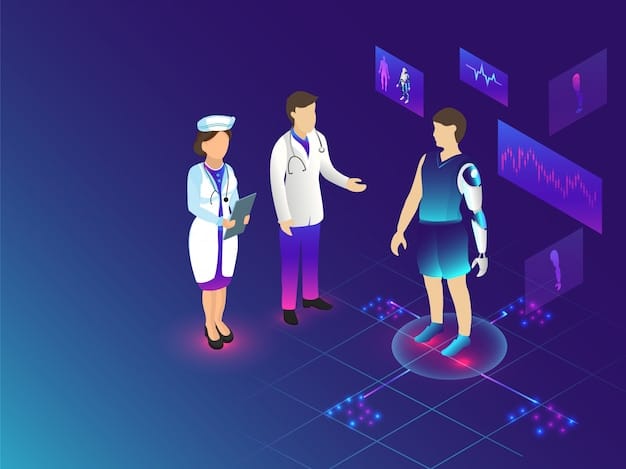AI Drug Discovery: Accelerating Medicine Development by 40% in US

AI-driven drug discovery is revolutionizing the pharmaceutical industry in the US, accelerating the development of new medicines by an estimated 40% through advanced data analysis, predictive modeling, and automation of key research processes.
The landscape of pharmaceutical research is undergoing a seismic shift, propelled by the integration of artificial intelligence (AI). AI-Driven Drug Discovery: How AI is Accelerating the Development of New Medicines by 40% in US Pharmaceutical Companies is no longer a futuristic concept; it’s a present-day reality, reshaping how new medicines are conceived, tested, and brought to market in the United States.
The AI Revolution in US Pharmaceutical Companies
The traditional drug discovery process is often time-consuming, expensive, and fraught with uncertainty. With AI, US pharmaceutical companies are finding ways to expedite this process, reduce costs, and increase the likelihood of success.
The promise of AI in drug discovery
The transformative potential of AI in drug discovery lies in its ability to analyze vast datasets with speed and accuracy, identifying patterns and relationships that would be impossible for humans to discern. This ability is driving a paradigm shift in how new medicines are developed.
AI offers several compelling advantages:
- Faster Target Identification: AI algorithms can sift through genomic data, scientific literature, and clinical trial results to pinpoint promising drug targets more quickly.
- Improved Lead Optimization: Machine learning models can predict the efficacy and safety of drug candidates, optimizing their chemical structures for enhanced therapeutic effects and reduced side effects.
- Reduced Failure Rates: By identifying potential problems early in the development process, AI can help pharmaceutical companies avoid costly failures in later stages.
By leveraging AI, pharmaceutical companies are able to dramatically accelerate their research timelines and bring innovative treatments to patients in need much faster. The result is a more efficient and productive drug-discovery ecosystem.

How AI is Accelerating Drug Development by 40%
The 40% acceleration in drug development cited in the title is not an arbitrary figure, it represents the tangible impact of AI implementation in US pharmaceutical companies. This speed boost is achieved through a number of different mechanisms.
Predictive Modeling and Simulation
AI algorithms can create predictive models that simulate how drugs will interact with the human body. This reduces the need for extensive laboratory testing and accelerates the process of identifying promising drug candidates.
The role of predictive modeling is crucial for several reasons:
Predictive modeling driven by AI allows for better decision-making in the early stages of drug discovery, decreasing the failure rates and eventually facilitating the development of new treatments.
AI in Target Identification and Validation
In the initial phases of drug discovery, identifying the appropriate biological targets is paramount. AI algorithms excel at sifting through vast amounts of biological data to reveal novel targets and validate existing ones more efficiently.
Analyzing Genomic Data
AI algorithms examine genomic data to spot how changes in genes cause diseases. This helps find potential targets for drugs that can specifically address these causes.
AI’s ability to analyze genomic data helps with:
- Efficiency: Decreasing the amount of compounds that have to be synthesized and tested.
- Precision: Fine tuning the drug molecules to increment their properties.
- Innovation: AI is able to test a broader chemical area for new compounds with therapeutic results.
AI-Powered Lead Optimization
Once potential drug targets are identified, the focus shifts to lead optimization – refining the chemical structure of drug candidates to improve their efficacy, safety, and pharmacokinetic properties. AI is dramatically improving this step.
Machine Learning and Drug Design
Machine learning algorithms help predict what each molecule will do and learn how chemical compounds are related to their therapeutic results, facilitating optimization.
Using AI for lead selection can help in:
AI for Clinical Trial Optimization
AI isn’t just useful in the lab; it is helping transform all aspects of clinical trials. From optimized protocols to patient selection and data analysis, AI helps make clinical trials faster and more effective.
Patient Recruitment and Selection
AI can optimize patient recruitment by identifying individuals who are most likely to benefit from a particular treatment. This leads to more efficient clinical trials with better outcomes.
- Expediting Recruitment: Finding the most adequate population of patients, augmenting the study’s speed.
- Diversity and inclusion: Making sure the studies reflects the population and helps to address inequality in treatment.
- Better Data collection: Improving data collection and monitoring for new insights and results.
AI integration in clinical trial provides a pathway for faster, efficient and highly focused new medicines.

Challenges and Considerations
While the benefits of AI driven drug discovery are undeniable, there are still challenges and considerations that need to be addressed in order to fully realize its transformative potential.
Data Quality and Availability
AI algorithms are only as good as the data they are trained on. Ensuring data quality and availability is critical for the success of AI-driven drug discovery efforts.
Here are some challenges to keep in mind:
By addressing those challenges, pharmaceutical companies can leverage the full potential of AI to create new medicines that change the lives of patients in need.
| Key Point | Brief Description |
|---|---|
| 🎯 Target ID | AI speeds up the identification of potential drug targets. |
| 🧪 Lead Optimization | AI refines drug candidates for better efficacy and safety. |
| ⏱️ Clinical Trials | AI optimizes patient selection and data analysis in trials. |
| 📊 Data Quality | High quality data is essential for accurate AI insights. |
Frequently Asked Questions
▼
AI algorithms analyze large datasets to identify potential drug targets and predict the efficacy and safety of drug candidates, significantly reducing the time and cost of traditional drug discovery methods.
▼
The main benefits include faster target identification, better drug optimization, decreased failure rates, and improved clinical trial outcomes, all of which contribute to a more efficient drug development process.
▼
AI uses genomic, proteomic, chemical, and clinical data. This data helps to find new drug targets, predict how drugs will likely behave and optimize clinical trials to maximize results.
▼
Yes, AI-driven efforts can present some risk such as, data bias, security concerns, and regulatory uncertainty. Addressing these risks is essential to responsibly implement it.
▼
By helping with patient enrollment, analyzing the effectiveness of the treatments, and predicting patient replies, AI is changing clinical research procedures, guaranteeing effectiveness.
Conclusion
AI-Driven Drug Discovery: How AI is Accelerating the Development of New Medicines by 40% in US Pharmaceutical Companies is revolutionizing the way we approach medicine. US pharmaceutical entities are using artificial intelilgence to speed drug discovery, increasing effectiveness of treatments, and, potentially, improve global healthcare.





